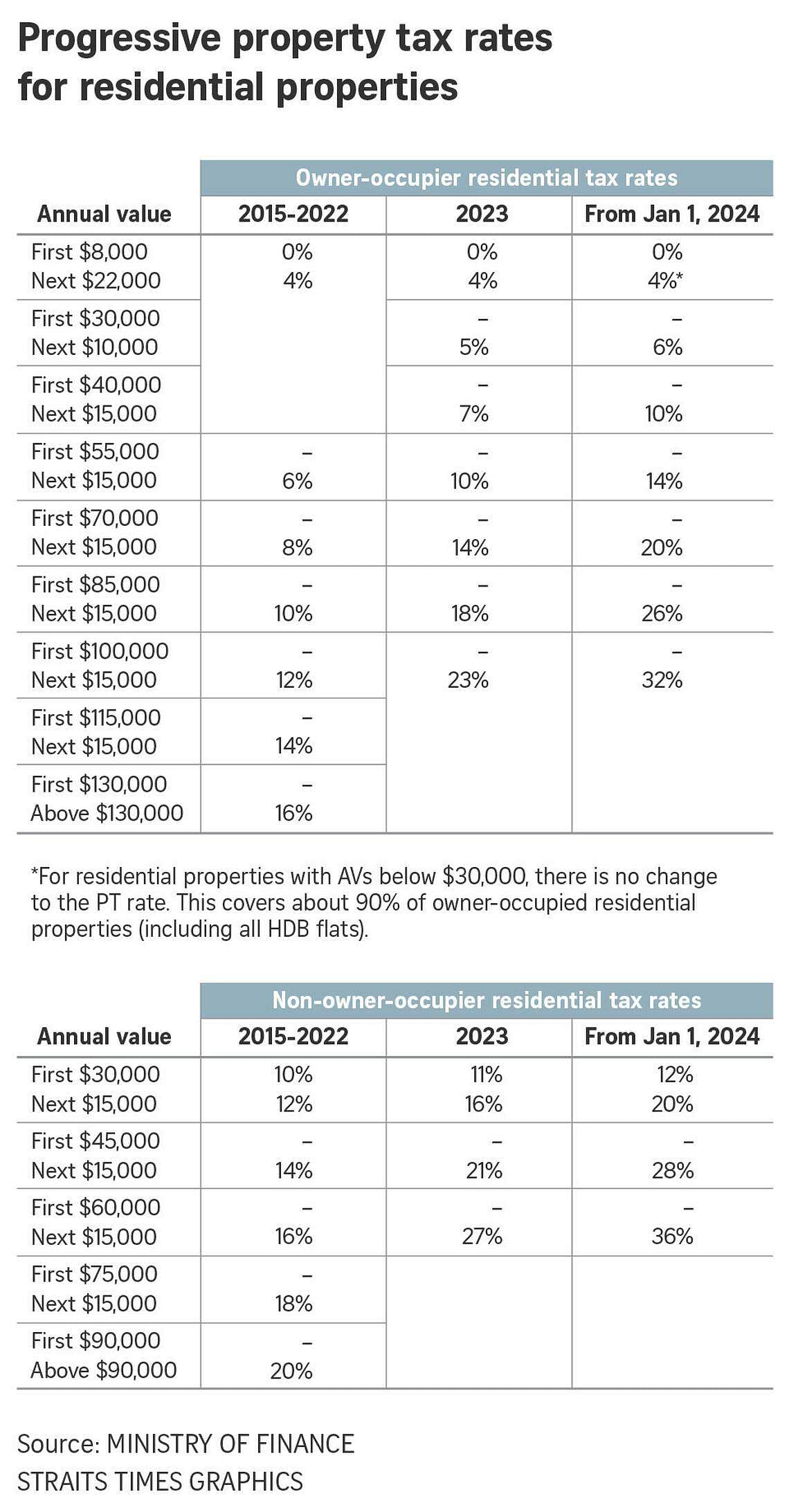Property taxes for most homes to rise in 2024; Govt to give one-off rebate to cushion impact
Property taxes for most home owners will go up in 2024 because of higher market rents and annual values for most residential properties, as well as an increase in property tax rates for higher-value private homes.
But the Government will provide a one-off rebate of up to 100 per cent for all owner-occupied homes to help cushion the impact of the tax increase amid cost-of-living concerns, the Ministry of Finance (MOF) and Inland Revenue Authority of Singapore (Iras) said in a statement on Nov 30.
The annual value of Housing Board flats and most private residential properties will be raised from Jan 1, as part of Iras’ yearly review of properties to calculate how much taxes should be paid, the authorities said.
A property’s annual value is its estimated yearly rent if it were to be rented out, and is determined based on the market rents of comparable properties and other factors.
The annual value is assessed for the purpose of property taxes, which are Singapore’s primary means of taxing wealth and are paid yearly.
As announced in Budget 2022, the second and final step of property tax rate increases will also take effect from Jan 1, with steeper hikes for higher-end properties. Those who own expensive private properties will feel the brunt of the revision, particularly owners of properties bought for investment.
The property tax rate increase will affect only residential properties not occupied by their owners and owner-occupied homes with an annual value of more than $30,000. All owner-occupied HDB flats are not affected.
With the property tax rebates announced on Nov 30, all one- and two-room HDB owner-occupiers will continue paying no property tax in 2024, as the annual values of their homes remain below $8,000.
For owner-occupiers of other flat types, the rebate will be automatically offset against any property tax payable. On average, they will face an average tax increase of less than $3 a month in 2024, with the increases ranging from $1.50 for a three-room flat to $6.30 for an executive flat after rebates.
The rebates, said MOF and Iras, are tiered to ensure that those with greater means pay their fair share of taxes and that Singapore’s property tax regime remains progressive.
For example, owner-occupiers of one- and two-room flats will get a 100 per cent rebate, while those who own four-room units will get a 50 per cent rebate. Executive flat owner-occupiers will receive a 30 per cent rebate, while those who own private properties will get a 15 per cent rebate.
For private property owner-occupiers, the increase in property taxes will be steeper for higher-end homes, while the bottom half of this group will see a property tax increase of less than $15 a month in 2024.
Iras monitors market rental trends to determine the annual value of properties. The last revision of annual values was on Jan 1, 2023.
In the third quarter of 2023, condo rental prices were up 19.3 per cent from the same period in 2022, according to the Urban Redevelopment Authority’s private residential rental index. HDB rents in October were up 14.1 per cent from October 2022, based on flash data from the Singapore Real Estate Exchange.
Higher annual value thresholds for social support schemes
Meanwhile, the Government will also be raising the annual value thresholds that are used to determine eligibility for social support schemes from 2024. This is to ensure that Singaporeans with greater needs continue receiving help amid rising annual property values.
These schemes include the GST Voucher scheme, MediShield Life premium subsidies and the Workfare Income Supplement Scheme.
From Jan 1, 2024, the annual value threshold will be raised from $13,000 to $21,000 for the first tier, which provides a higher quantum of benefits. The revised threshold will cover all HDB flats, MOF said.
The second tier, which provides a lower quantum of benefits, will see a higher annual value threshold too.
The revised annual value threshold of $25,000, up from $21,000, will cover about three-quarters of residential properties, including some lower-value private homes.
For example, an eligible owner-occupier of a five-room HDB flat with an annual value of $11,000 in 2022 would have received $700 in GST cash vouchers in 2023.
If the annual value of this person’s property rose to $14,000 in 2023, and assuming other eligibility criteria are met, he or she will receive $850 in GST cash vouchers in 2024.
Had the annual value thresholds not been revised, this individual would have received the lower-tier quantum of $450, MOF said.
A property’s annual value in the preceding year determines an individual or a household’s eligibility for social support schemes in a given year.

Get The New Paper on your phone with the free TNP app. Download from the Apple App Store or Google Play Store now

